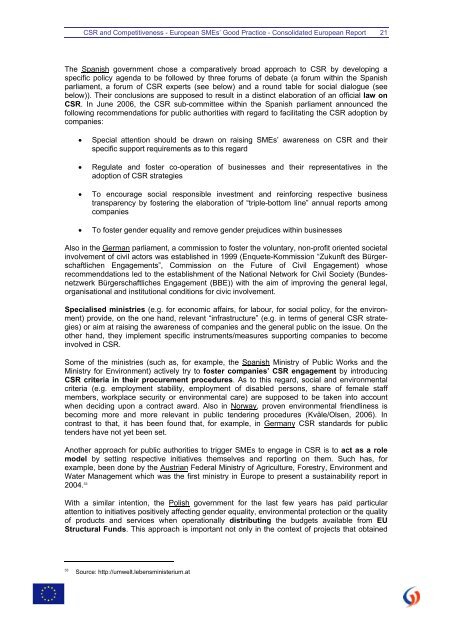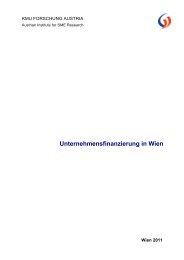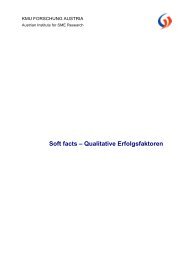CSR and Competitiveness European SMEs - KMU Forschung Austria
CSR and Competitiveness European SMEs - KMU Forschung Austria
CSR and Competitiveness European SMEs - KMU Forschung Austria
You also want an ePaper? Increase the reach of your titles
YUMPU automatically turns print PDFs into web optimized ePapers that Google loves.
<strong>CSR</strong> <strong>and</strong> <strong>Competitiveness</strong> - <strong>European</strong> <strong>SMEs</strong>’ Good Practice - Consolidated <strong>European</strong> Report 21<br />
The Spanish government chose a comparatively broad approach to <strong>CSR</strong> by developing a<br />
specific policy agenda to be followed by three forums of debate (a forum within the Spanish<br />
parliament, a forum of <strong>CSR</strong> experts (see below) <strong>and</strong> a round table for social dialogue (see<br />
below)). Their conclusions are supposed to result in a distinct elaboration of an official law on<br />
<strong>CSR</strong>. In June 2006, the <strong>CSR</strong> sub-committee within the Spanish parliament announced the<br />
following recommendations for public authorities with regard to facilitating the <strong>CSR</strong> adoption by<br />
companies:<br />
• Special attention should be drawn on raising <strong>SMEs</strong>’ awareness on <strong>CSR</strong> <strong>and</strong> their<br />
specific support requirements as to this regard<br />
• Regulate <strong>and</strong> foster co-operation of businesses <strong>and</strong> their representatives in the<br />
adoption of <strong>CSR</strong> strategies<br />
• To encourage social responsible investment <strong>and</strong> reinforcing respective business<br />
transparency by fostering the elaboration of “triple-bottom line” annual reports among<br />
companies<br />
• To foster gender equality <strong>and</strong> remove gender prejudices within businesses<br />
Also in the German parliament, a commission to foster the voluntary, non-profit oriented societal<br />
involvement of civil actors was established in 1999 (Enquete-Kommission “Zukunft des Bürgerschaftlichen<br />
Engagements”, Commission on the Future of Civil Engagement) whose<br />
recommenddations led to the establishment of the National Network for Civil Society (Bundesnetzwerk<br />
Bürgerschaftliches Engagement (BBE)) with the aim of improving the general legal,<br />
organisational <strong>and</strong> institutional conditions for civic involvement.<br />
Specialised ministries (e.g. for economic affairs, for labour, for social policy, for the environment)<br />
provide, on the one h<strong>and</strong>, relevant “infrastructure” (e.g. in terms of general <strong>CSR</strong> strategies)<br />
or aim at raising the awareness of companies <strong>and</strong> the general public on the issue. On the<br />
other h<strong>and</strong>, they implement specific instruments/measures supporting companies to become<br />
involved in <strong>CSR</strong>.<br />
Some of the ministries (such as, for example, the Spanish Ministry of Public Works <strong>and</strong> the<br />
Ministry for Environment) actively try to foster companies’ <strong>CSR</strong> engagement by introducing<br />
<strong>CSR</strong> criteria in their procurement procedures. As to this regard, social <strong>and</strong> environmental<br />
criteria (e.g. employment stability, employment of disabled persons, share of female staff<br />
members, workplace security or environmental care) are supposed to be taken into account<br />
when deciding upon a contract award. Also in Norway, proven environmental friendliness is<br />
becoming more <strong>and</strong> more relevant in public tendering procedures (Kvåle/Olsen, 2006). In<br />
contrast to that, it has been found that, for example, in Germany <strong>CSR</strong> st<strong>and</strong>ards for public<br />
tenders have not yet been set.<br />
Another approach for public authorities to trigger <strong>SMEs</strong> to engage in <strong>CSR</strong> is to act as a role<br />
model by setting respective initiatives themselves <strong>and</strong> reporting on them. Such has, for<br />
example, been done by the <strong>Austria</strong>n Federal Ministry of Agriculture, Forestry, Environment <strong>and</strong><br />
Water Management which was the first ministry in Europe to present a sustainability report in<br />
2004. 33<br />
With a similar intention, the Polish government for the last few years has paid particular<br />
attention to initiatives positively affecting gender equality, environmental protection or the quality<br />
of products <strong>and</strong> services when operationally distributing the budgets available from EU<br />
Structural Funds. This approach is important not only in the context of projects that obtained<br />
33 Source: http://umwelt.lebensministerium.at




